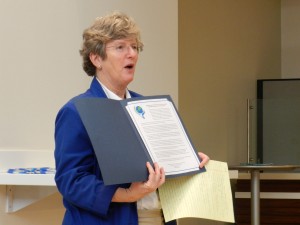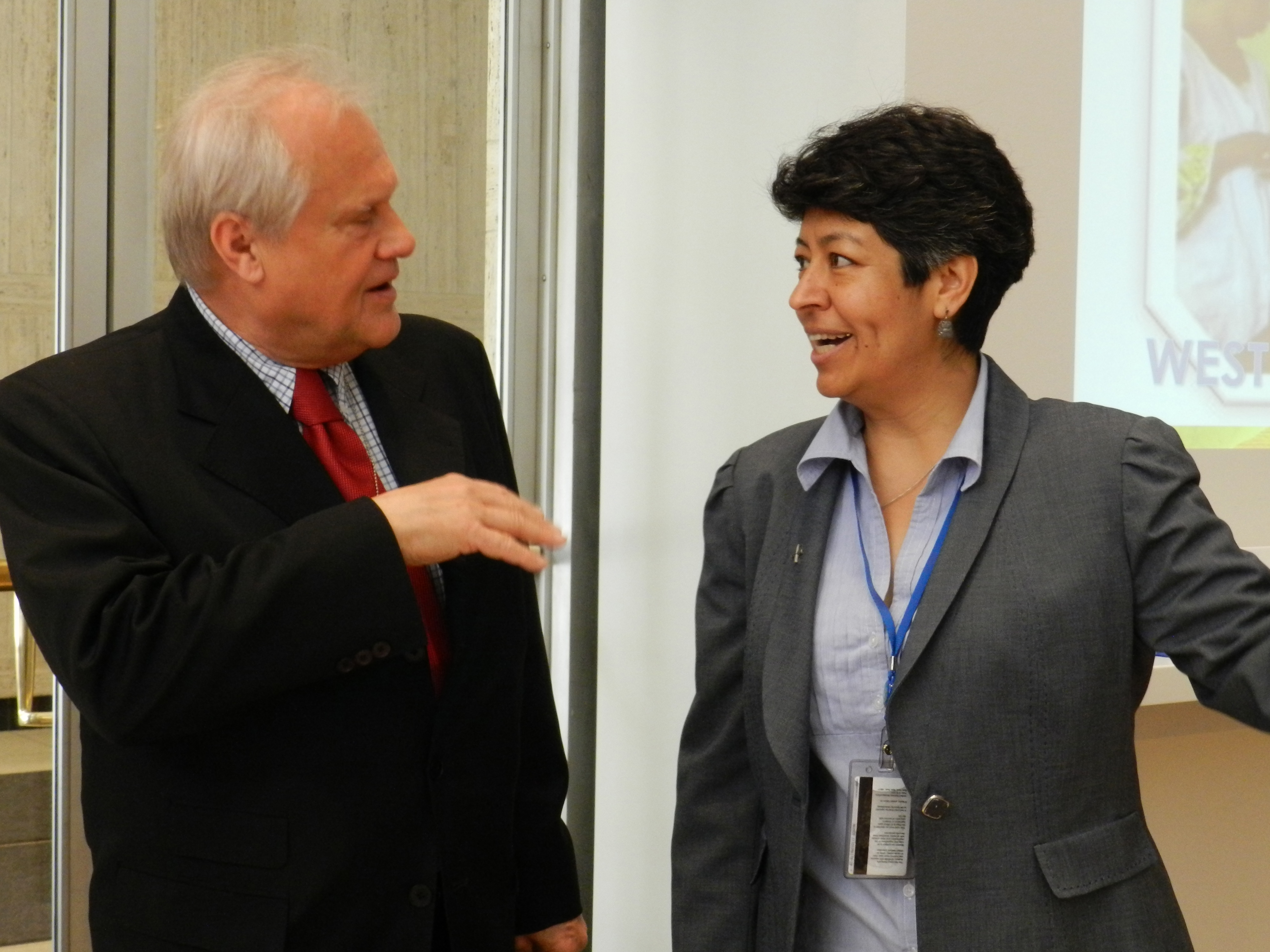At the end of April twenty-eight Sisters of St. Joseph from fourteen countries and five continents came together in Brentwood, NY, to strategize how they might use their presence and influence to collaborate with their UN-NGO representative toward achieving sustainable development.  Among their activities was ratification of a statement on systemic change for social and sustainable development which they officially presented to Ambassador Martin Sajdik of Austria, the president of ECOSOC. This statement will be the foundation for their work in the coming months.
Among their activities was ratification of a statement on systemic change for social and sustainable development which they officially presented to Ambassador Martin Sajdik of Austria, the president of ECOSOC. This statement will be the foundation for their work in the coming months.
Following are (1) the Statement on Sustainable Development and (2) Comments from several participants
Statement on Sustainable Development
“This week has been a wonderful opportunity to reconnect with friends involved in justice and peace work from all around the world, and to get to know new participants as we prayed, worked, and socialized together. I have been moved by the many different ways that Sisters of St. Joseph are acting as vehicles of God’s transforming energy in the world.
In our meeting with the President of ECOSOC, we heard about the tremendous global challenges that the people of the world must address. As an international Justice and Peace group, we are learning how to work together more effectively so that we can contribute to this transformative work. Indeed, we have seen that, when we collaborate with each other, we can be a strong force for systemic change. ”
— Sue Wilson, csj – Canada
“Spending this time with our Josephite sisters from across the globe has been an overwhelming honour and an undeniable challenge. The inspiration of all that is being witnessed by the commitment of our Sisters in Europe, Madagascar, Canada, the US, South America, Africa, Haiti, Timor, Australia and New Zealand reminded us of what is at the heart of the Josephite call – the urgency, in the heart of our God, to walk with those we call neighbour, particularly those who are being denied fullness of life at this time.
Timothy Radcliffe’s words kept reverberating through my mind: “The crisis facing religious life is precisely the same as that facing the whole of humanity: how to deal/communicate/ relate to ‘the other’.”
As we wrestled with five different languages, and many more cultures, I was struck over and over again by the richness of our diversity and our deep desire for unity, evidenced in the numerous and often quirky ways we shared communion.
Struggling together to face our different realities creatively, I had the really strong feeling that we were in fact embodying Timothy’s challenge and witnessing to the strong call of the global community – to live unity within the richness of our diversity.”
— Jan Barnett, rsj -Australia
“An international meeting has its difficulties surrounding languages along with its rich cultural experiences. The challenge is to minimize the difficulties and maximize the richness of the cultural diversity that exist in the group. I think this was achieved during this week’s meeting, and certainly the choice of Gloria Philip as a facilitator helped the participants to move through the meeting.
The prayer experiences were enriching as well as the large group sharing. Table discussions and the sharing of ideas was both informative and supportive. The choice of Margaret Mayce, OP, and Amanda Lyon to address the participants was a very good one. The input by Margaret Mayce, OP, on the workings of the UN-NGOS and Amanda Lyons on the Universal Periodic Review (UPR) was well done and well organized. I appreciated all the efforts involved in organizing the meeting with the President of ECO-SOC, Ambassador Sajdik of Austria, and his address to the group was particularly informative, and the presenting of the CSJ Statement “Congregations of Saint Joseph at the UN-NGO Statement Engagement in Advocacy for Systemic Change” was an important moment in the history of this group. The tour of the United Nations was appreciated by all who participated.
Did this week meet expectations? Absolutely! Despite the language and cultural differences, this group was able to move forward with a plan of action around the CSJ Statement that will have a global impact as Sisters of St. Joseph.”
— Linda Pepe, csj – USA – Chambéry Congregation
“Today we are hearing a great deal about evolving consciousness expressing what so many claim is the next step in our understanding of who we are as CSJ women. However, many struggle to understand what we are speaking about. In April in Brentwood, the Global Justice and Peace and Integrity of Creation group met for one week. We came from many parts of the world, speaking different languages, with different cultural experiences and many different issues relating to our justice agenda in our home countries. Learning how to listen and understand and continue to dialogue was not always easy. However, we did evolve in our common purpose and discover how our common charism is guiding us in understanding each other. Perhaps this is one concrete example of what evolving consciousness can mean.
One of the highlights was our growing understanding of how our CSJ UN-NGO can help us advance our work. We began looking at a Statement we presented on Thursday to the Austrian Ambassador at the UN who heads ECOSOC to which our UN-NGO is connected. During this luncheon gathering Mr. Martin Sajdik, spoke about the insights and learnings of the UN around the MDG’s and the areas that were not addressed by the MDG’s. Much of this learning from the past years is shaping the new focus and the setting of goals or targets for the Sustainable Development Goals which will be announced for 2015 to 2030. Mr. Sajdik talked with us for almost an hour and then engaged many of our group asking about the realities in our home countries from our perspectives. He was very aware of many of the realities and issues of which we spoke. He is a Catholic and he spoke about the hope he sees in Pope Francis and his efforts at turning the eyes of the Catholic Church towards those on the margins of our world.
Although the Sustainable Development Goals are multiple, they will focus light on many more specific issues and groups of people. These goals may give us insight to help us in our work. The SDG’s have not yet been published, but we received a preview of what is to come. They will cover everything from the environment, to those who live in poverty. Within them I think there is a lot of opportunity for us to work.” together as a Global CSJ JPIC group and continue to evolve our work.
— Joan Atkinson, CSJ – Canada
“This has been a wonderful week and I have learned a lot. To meet so many Josephites from different countries has been a blessing, and the welcome and hospitality of the Brentwood and other sisters has been heart-warming.
My eyes have been opened to the opportunities available for Justice and Peace work with the United Nations. I have a different appreciation of the UN in that it seems far more accessible than I had thought. Amanda’s presentation was particularly good. Working with and through a country’s mission at the UN is attractive and achievable as a means of working for justice and peace, and the Universal Periodic Review appears to be a tool with great possibilities. The Statement of the CSJ-UN-NGO is a starting point for focussing on issues which continue to need attention for the good of the people of the world.
Someone remarked that this CSJ group was a little like the UN itself, and I think this is very true. The difficulties associated with communication, cultures and different issues complicate the process of deciding how the group will operate, even one which shares the same basic spirit, as ours does. There is a tension in balancing the fluidity necessary to accommodate all and the formation of suitable structures to ensure its continuation.
I do think that a group which first and foremost facilitates communication is necessary, one which is ‘animating’ more than ‘coordinating’, but that such a group needs to be resourced properly. If it is left to sisters who are already too busy, it will not happen. The Leaders of the various Federations and Congregations need to show that they want this to continue by contributing appropriate finance and personnel.
–Susan Connelly, RSJ – Australia

